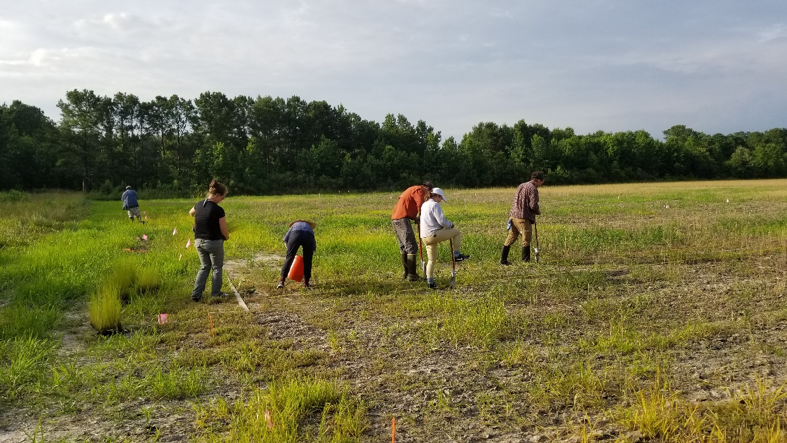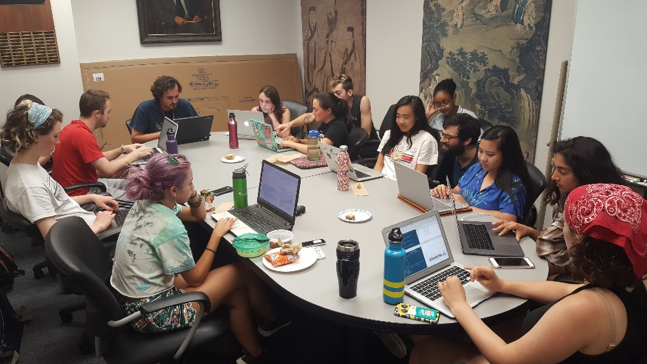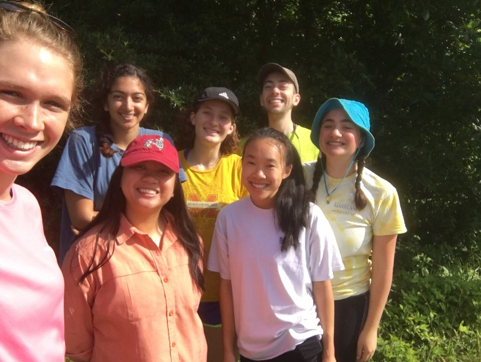
It’s a searing summer day on the Eastern Shore of Maryland, and in chest-high waders carrying 30 pounds of soil on your back, the humidity is almost unbearable. We have spent long hours in the field and the lab as a budding undergraduate and graduate researchers, wading through wetlands and tromping through fields for the sake of “research.” The question arises in each of us – “Why am I doing this?”
The typical summer research internship is full of difficult yet fundamental tasks that challenge the limits of a student’s resolve and may lead them to feel demoralized and isolated. As a result, interns often lose that connection to the “why” of the research, stifling creativity and discouraging potential scientists. Many view internships as opportunities for undergraduates to begin work on professional research, but does a summer full of menial tasks make you a better researcher?
This summer, four SESYNC graduate students led a series of socio-environmental synthesis workshops to enhance the undergraduate intern experience. We designed these workshops to connect undergraduate researchers to the larger research motivation. In the workshops we used a socio-environmental lens to explore the conceptual models, contexts, data, and real-world stakeholders that motivate our research. For example, we challenged interns to explore jargon-free communication by writing the first two sentences of their elevator pitch using only the one thousand most-used words. To explain saltwater intrusion on agricultural fields without using ‘salt’, ‘ocean’, or ‘farm’, the interns came up with: “People that grow food need money, and people that work on water and land want to make the world a better place” and “I study how the largest body of water is coming into the land. How does a person who manages the land grow food for the world?” With this exercise, interns learned how much of our vocabulary we take for granted when communicating to a broader audience.

Outside of science communication, we focused on why our research matters for the people living or working in the ecosystems we study. Scientific research into socio-environmental systems can help untangle the knot of relationships between people, other organisms, and their environments to inform policies aimed at environmental problems. Day after day, interns collected and analyzed soils from the working landscapes of Maryland’s Lower Eastern Shore. All that work helps us understand what happens to nutrients and plant yields as saltwater intrudes inland into farm fields. However, interns may not see how their daily tasks relate to the big questions of a research project. We wanted to connect interns to the broader importance of their work and spent an afternoon with around a dozen interns discussing how people study social aspects of these systems. For those working on the Eastern Shore, this meant talking about the economic and cultural impact of saltwater intrusion on homeowners and farmers and the legal ramifications of nutrient losses from the abandoned farm fields to the Bay, then identifying the government institutions that might benefit from a better understanding of this system. The interns appreciated taking the time to consider the “why” of our research in this way. As one said, “The workshops helped me put my research into perspective in terms of the social implications and it also helped me think about how I would communicate what I’m doing to different stakeholders.”
A little perspective can go a long way in developing a young scientist’s career. “The training will be very helpful to talk to other people about what I've done this summer and to explain why what I've been working on is important...and isn't a purely academic pursuit,” one intern explained. This is the attitude that will keep young people engaged in socio-environmental research beyond just a summer job. These workshops were helpful for us graduate students too--sometimes we get trapped in our research rabbit holes and could use a bit of perspective of our own. So why not try it yourself? The next time it’s 5:00 am and you and your crew are rolling out of bed for a day of swatting mosquitoes and wringing out socks, it’ll be not with a grimace, but with a wry smile and a sense that your work might matter.
